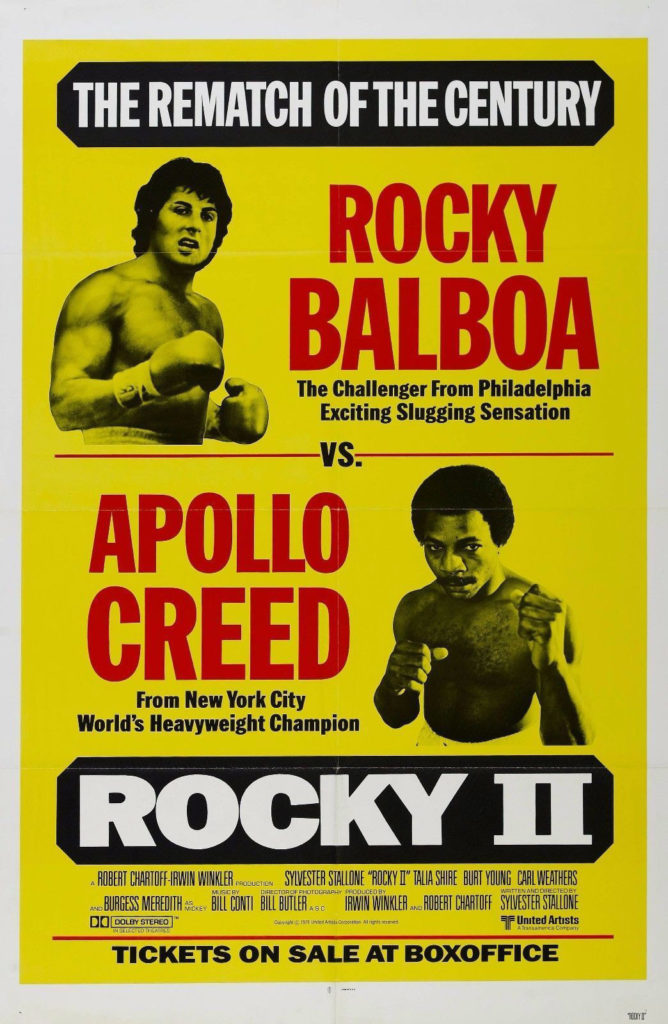Hollywood legend is replete with stories of Sylvester Stallone’s efforts to get Rocky made. Part of the fable is that Sly wanted to direct, but eventually had to agree to hand directorial duties over to someone with experience. Sly kept the starring role and Rocky was his screenplay, but John G. Avildsen sat in the director’s chair. The resulting film won Best Picture and Director, plus Best Film Editing, at the Academy Awards. When it came time for a sequel, however, Sly used the capital he had earned to secure the directing gig in addition to starring and screenwriting roles, after Avildsen declined to direct due to a scheduling conflict. The result is a film identical in theme, plot, location, and stars to Rocky, but which is inferior in execution.
The decline in quality from Rocky to Rocky II is evident from the open of the film. The beginning recaps the end of Rocky, just in case there was someone at the back of the theater who hadn’t seen the first film. Using the finale of the previous film to open a sequel is lazy — typical of b-horror and not the sequel to a Best Picture winner. In addition, Bill Conti’s iconic music has been twisted into some amalgamation of disco and contemporary primetime TV music. He retains credit as composer so he can’t be blameless. After footage original to this film begins to roll, it looks even more like an episode of Charlie’s Angels or CHiPs. It all looks that cheap.
The plot picks up the night of Rocky’s fight against Apollo Creed (the main cast members in Rocky II are identical to those in Rocky). Rocky and Apollo go their separate ways after a post-fight stay in the hospital. Apollo is bothered by the fact that, although he won the fight, he was unable to decisively defeat Rocky. For his part, Rocky is unconcerned with the outcome of the fight. He had his shot, and acquitted himself well. He got a $37,000 payday, hardly peanuts in 1976, and is ready to enter the next chapter of his life — wife to Adrian, hopefully soon-to-be-father, and…what else? That’s the problem. Rocky is a fighter. It’s all he’s ever done, and it turns out that after the purse for the fight goes to house, car, and unnecessary baubles, there are still  bills to pay. Rocky made a promise to Adrian that his fighting days were over, but he bravely ignores his wife’s concern for his health and agrees to a rematch with Apollo so we audience members don’t get bored and leave the theater.
bills to pay. Rocky made a promise to Adrian that his fighting days were over, but he bravely ignores his wife’s concern for his health and agrees to a rematch with Apollo so we audience members don’t get bored and leave the theater.
It was a close thing, too. This movie tracks so closely to Rocky that Sly set an unnecessary challenge for himself in trying to make lightning strike the same place twice. In order to tell a story with which audiences are already deeply familiar, Sly resorts to increased melodrama with the promise of tragedy. Instead of being a better or more satisfyingly complex narrative, it feels cheap and manipulative.
The problem is Sly. Rocky is his creation. To separate him from the character would be folly. Of course, after the success of the first film, he should have been given greater freedom to tell Rocky’s story in his way. The result is Rocky II. It is Rocky, had Rocky been directed by Sly. It is also evidence that keeping Sly away from the director’s chair for the first film was a good idea.
In all the ways that Rocky is great, this film is weak. In all the ways that Rocky is weak, this film compounds those mistakes. It ratchets up the melodrama, and further distorts the realism of the boxing. It’s a shame, but Stallone chose to abandon all realism for the sake of his overwrought narrative.
Finally, the limits of Sly’s abilities as a director are apparent in the performances of the cast. In multiple scenes there are important lines and soliloquys where Sly either couldn’t get a performer’s best work, or couldn’t tell which take was acceptable. Burgess Meredith shined in Rocky when Mickey came begging to be Rocky’s trainer. In Rocky II he has many scenes where he tries to inspire Rocky, and more than one felt like a first read-through. It was that bad.
Burt Young, who did so well in the first film, sees his character relegated to the background in this film. It’s a hard loss in a film that struggles for narrative relevance, while Talia Shire’s character, Rocky’s wife, remember, has been reduced to such an inanimate object that her greatest contribution to Rocky’s progression is falling into a coma.
Rocky II is a poor imitation of Rocky. Sly earned his chance to make Rocky in the way he wanted, and the result is a mediocre film. Sly was part of a great project in Rocky, but this film exposed his limitations as a filmmaker.
